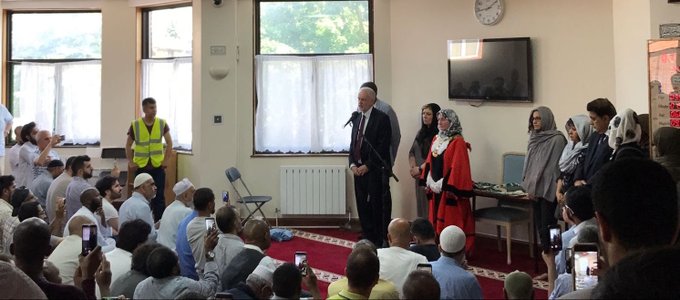The White House’s Islamophobia problem can no longer be ignored.
In London, there was yet another terrorist attack involving a driver in a van mowing down pedestrians. This time, though, the victims were intended to be Muslims, singled out by an apparently hate-filled assailant who wanted to kill worshipers exiting north London's Finsbury Park Mosque after Ramadan prayers.
The hideous Sunday incident, which caused at least one death and multiple injuries, led to a familiar reaction: Outrage, grief, mourning and a show of solidarity, led by British politicians and religious leaders. The alleged attacker — identified as Darren Osborne, a white 47-year-old man — was said to have screamed "I want to kill more Muslims" before being confronted and beaten by angry bystanders. It required the intervention of the mosque's imam to spare him further harm before police took him away.
"This was an attack on Muslims near their place of worship and, like all terrorism in whatever form, it shares the same fundamental goal," said British Prime Minister Theresa May. "It is a reminder that terrorism, extremism, and hatred take many forms, and our determination to tackle them must be the same whoever is responsible."
Her main opponent, Labour Party leader Jeremy Corbyn, went to the mosque and spoke to its grieving congregation.
While we've grown tragically accustomed to British officials showing their stiff upper lips in the face of these attacks, we have also witnessed rather different reactions from President Trump. A full 24 hours after the incident, Trump had yet to express condolences to the attack's victims or support for London. Contrast that to his rushed messagingwhen groups like the Islamic State are suspected to be involved.
In the wake of a previous attack at London Bridge, Trump immediately took to Twitter to bemoan "political correctness." He invoked the chaos in Britain as justification for his own controversial plans to impose a travel ban on a handful of Muslim-majority countries. Suffice it to say, Trump issued no tweets about the perils of disgruntled middle-aged white Britons coming to America and renting vans.
"That Trump hasn’t mentioned the attacks on Muslims in London isn’t surprising, mind you. It took days for him to praise the two men who were stabbed to death in Portland, Ore., while defending Muslim women on a train," wrote my colleague Philip Bump. "It took almost a week for him to speak out about the shooting of two Indian men in Kansas by someone who thought that they were Muslim."
Bump went on, suggesting Trump doesn't have much appreciation for Muslim victimhood: "To view attacks by Muslims as part of what being Muslim is about but attacks on Muslims as being distinct from the identities of the perpetrators demands seeing those two groups as fundamentally different. Trump has a presumption of guilt for Muslims that he doesn’t for the white people who committed the crimes in Kansas, Portland and at the London mosque.
Trump's silence was made all the more conspicuous by other foreign leaders, including a tweet from Canada's prime minister. Don't forget that early in his tenure, Trump was publicly quiet after a white supremacist shot up a mosque in Quebec City. Many commentators derided Trump for his clear double standards.
But the problem is about much more than Twitter. As we've covered before, the Trump White House seems to operate at times on fumes of Islamophobia. Trump campaigned on anti-Muslim demagoguery and has since sought to implement edicts that many analysts (and some federal courts) consider discriminatory toward Muslims. His administration enlisted senior advisers who don't see Islam as a real religion. This year, bucking an annual tradition that stretches back to 1996 — and by other accounts, more than two centuries — the White House will likely not host an iftar dinner to commemorate Ramadan.
"There has so far been no word from President Trump’s administration on whether the White House intends to host such an event this year," wrote my colleague Amy B Wang. "Secretary of State Rex Tillerson has reportedly already said the State Department will break with recent tradition and not host a Ramadan reception, as it has done nearly annually for two decades. White House officials did not respond to repeated requests for comment."
The absence of such an event now speaks volumes — louder, perhaps, than Trump's supposed overtures to the Muslim world while visiting Saudi Arabia last month. Even then, Trump made no mentio of the millions of Muslims in his own country and avoided talk of the rich achievements of Islamic empires when extolling the greatness of the Middle East's history. The inference one is compelled to make is that the president has a callous disinterest in the successes of Muslims and is almost exclusively animated by their perceived misdeeds.
It's a position that does little to staunch the toxicity of the moment on both sides of the pond. As my colleagues noted, the Finsbury Park mosque attack feeds into a kind of polarization that is exactly what jihadists in the Islamic State want. It led to an outpouring of frustration from British Muslim groups, who warned about rising Islamophobia and threats to their communities.
"As any Muslim living in Britain will tell you, this attack — as well as the anti-Muslim sentiment that preceded it — didn't happen in a vacuum," wrote British columnist Hussein Kesvani. "Years of anti-Muslim headlines in Britain's tabloid newspapers have created an environment that has fundamentally dehumanized communities, to the point where Muslims can only be terrorists, groomers, benefits scroungers or some combination of the three. New far-right outlets like Breitbart ... go further, insinuating that Muslims living in Britain are invaders, planning to impose Sharia law onto Britain's high streets and force your nan to wear a burqa."
Trump's counterparts in Britain have spoken out against such fear-mongering and demonization. He, on the other hand, has only encouraged it.





Comments
Post a Comment